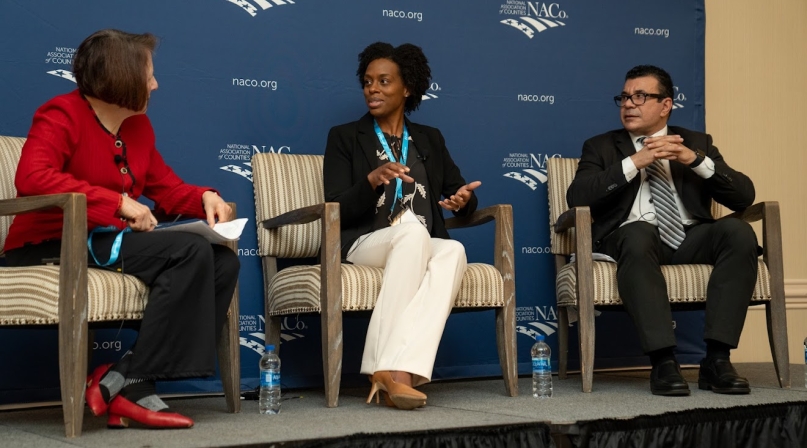NACo Healthy Counties Forum takes on pandemic

Key Takeaways
American life expectancy fell for the second straight year, underscoring the grave threat that COVID-19 continues to pose. Convening recently in Wake County, N.C., NACo’s Healthy Counties Forum focused primarily on the pandemic, the most prominent current threat to well-being.
The long-term repercussions of the pandemic were unavoidable, but so too were the focus and attention county public health officials have received from elected officials, who have seen the health and economic impacts transform their counties.
Since COVID-19 first spread in the United States in 2020, counties have taken a more deliberate approach toward maintaining partnerships to do their work protecting lives, determining equitable distribution of resources and addressing the impact that stress has had on the county workforce. The April 6-8 forum looked at these issues and more, with an emphasis on protecting against the next pandemic and wisely investing American Rescue Plan Act (ARPA) funding.
“Everyone had an idea how to spend the money 10 times over, but we had to be smart about where to invest the money,” said Nick Macchione, director of San Diego County’s Health and Human Services Agency, during the forum’s opening general session April 7. “We’ve used our ARPA money to invest in building out our public health [capacity].”
Noting that those needs would continue for years, Macchione preached sober deliberation and a systematic approach, reflecting on his county’s decision-making process, which included public input from five meetings. But in the end, the money was available to address a public health emergency, and reinforcing public health capacity, while not sexy or eye-catching, was prudent.
“We were thinking about these monies with intentional focus,” he said.
“Not to immediately respond, but thinking about the future of ‘Yes, we had people who were hungry; yes, we have people who are scared,’...but thinking about how we’re going build the infrastructure… making sure that the investments we have…have a lifelong approach.”
Nicole Mushonga, associate medical director and epidemiology program director for Wake County, agreed that buttressing the first line of defense against contagious disease was crucial, but that didn’t necessarily involve spending money as much as spending time and effort.
“One of the most important things is relationships, partnerships,” she said. “We need to be working and building on those relationships and partnerships prior to the crisis, we have to have them established because when things happen, you have to act, and you have to act quickly.”
In Wake County’s case, it was relying on partners to disseminate information about how the virus worked, how residents could get tested and eventually, how they could be vaccinated. Faith communities helped.
“They were the trusted people in the communities,” Mushonga said. “It wasn’t us — me or our team — going in, it was using those trusted messengers. We might not have always had the resources or staff, but we had the churches, who brought their congregations and their support.” Macchione said that meeting the public with data was crucial to reinforcing public health messaging that was stymied at times by misinformation, which Mushonga seconded.
“We were able to utilize that data to really drive the work that we were doing within very specific areas,” she said. “We got down to the ZIP code and census-tract level, where we actually partnered with our hospital systems to go door-to-door, offering services for individuals who couldn’t get out or didn’t have access or transportation.”
Cognizant that not every county had $350 million in ARPA funding like San Diego, Macchione stressed that the kind of partnerships that he saw as crucial for public health needs were not exclusive to urban counties.
“I go out to rural parts of our county and some of those are the most innovative partnerships I’ve seen,” he said. “If there’s only one thing you can do, go back home and take stock of ‘What are those partnerships?’ Can you define them, if you had an emergency, and you were to call and convene, would they come and would they roll their sleeves up with you?”
In addition to workshops and discussion groups, summit attendees also toured:
Wake County’s Poe Center, a nonprofit focusing on youth health education.
Healing Transitions, an organization addressing chemical dependency among the unhoused and
Oak City Cares, a coordinated day program for the unhoused that offers hygiene services and the opportunity to meet with human service providers.
Attachments
Related News

Drug tracking software helps counties identify trends, save lives
Florida counties are using an artificial intelligence tool called Drug TRAC to track and report drug trends, with the aim of providing quicker outreach and saving lives.

White House Executive Order establishes national substance use disorder response
On January 29, the White House issued an Executive Order (EO) establishing the Great American Recovery Initiative, a new federal effort aimed at coordinating a national response to substance use disorder (SUD).

USDA and HHS release new dietary guidelines
On January 7, U.S. Department of Agriculture Secretary Brooke Rollins and U.S. Department of Health and Human Services Secretary Robert F. Kennedy, Jr. unveiled the new Dietary Guidelines for Americans, 2025–2030.
